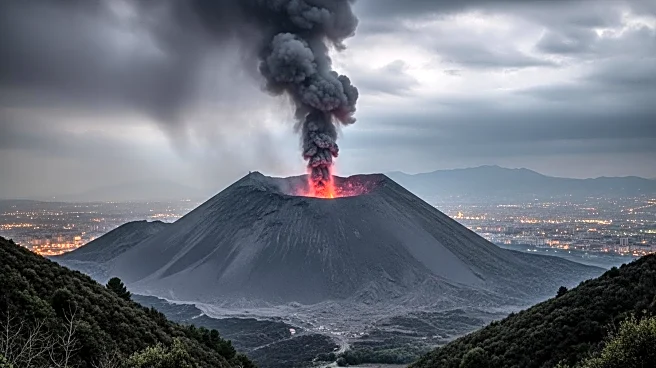What's Happening?
The Campi Flegrei volcano, located near Naples, Italy, is showing signs of increased activity, raising concerns about a potential eruption. Historically known as the entrance to the underworld in Greek and Roman mythology, the volcano's past eruptions have had significant impacts, including blocking out the sun and causing global temperature drops. Currently, the region is experiencing frequent earthquakes, with tremors reaching magnitudes of up to 4.6, which have been strong enough to crack walls and cause residents to flee their homes. The ground in the area is also swelling, having risen 4.6 feet since 2005, indicating potential volcanic activity. Scientists, including Giovanni Macedonio from the National Institute of Geophysics and Volcanology, are closely monitoring the situation, as an eruption could disrupt air travel across Europe and affect hundreds of thousands of residents living in the volcano's crater.
Why It's Important?
The awakening of the Campi Flegrei volcano poses a significant threat to the densely populated region surrounding Naples. An eruption could lead to widespread evacuations, affecting approximately half a million people in the red zone. The potential for air travel disruptions across Europe could have economic repercussions, impacting tourism and trade. The situation underscores the importance of disaster preparedness and the need for effective monitoring systems to mitigate risks. The use of artificial intelligence by scientists to understand the volcano's behavior highlights the role of technology in managing natural disasters. The ongoing seismic activity serves as a reminder of the unpredictable nature of volcanic systems and the challenges in predicting eruptions.
What's Next?
Authorities and scientists will continue to monitor the Campi Flegrei volcano closely, using advanced technology to track seismic activity and ground swelling. Residents in the affected areas may face evacuation orders if the situation escalates. The Italian government may need to implement emergency response plans to ensure the safety of those living in the red zone. Internationally, airlines and travel companies might prepare for potential disruptions in air travel. The scientific community will likely focus on improving predictive models to better understand volcanic behavior and enhance early warning systems.
Beyond the Headlines
The situation with the Campi Flegrei volcano highlights broader issues related to living in seismically active regions. It raises questions about urban planning and the risks of building communities near active volcanoes. The cultural and historical significance of the region, coupled with the potential for natural disasters, presents a complex challenge for local authorities. The reliance on technology and scientific research to predict and manage natural disasters reflects a growing trend in disaster risk reduction strategies. The event also emphasizes the need for public awareness and education on living with natural hazards.









